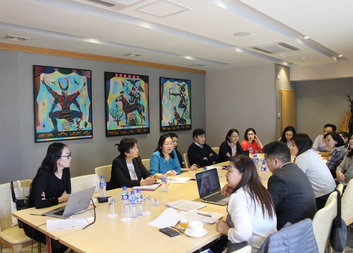In the first months of 2019, Caritas Czech Republic (CCR) in Mongolia established a Working Group (WG) in order to develop, improve and eventually approve regulations on construction and demolition waste management. The WG was established under the project ‘Improving resource-efficient and cleaner production in the Mongolian construction sector through materials recovery’, which supports sustainable consumption and production in Mongolia and efficiency in the construction sector.
The WG consists of 18 members who represent main stakeholders from governmental and non-governmental organizations. In particular, senior officials, heads of departments and specialists from 4 ministries, National Security Council, Inspection Agency, Building Development Center, construction material manufacturers, construction associations and national waste recycling associations are represented in the group.
From March till August 2019, 6 meetings of the WG have been organized to analyze the existing legal framework and to work on the draft of the new ‘Construction and Demolition Waste Regulations’. Furthermore, the representatives of the WG participated in a one-week training program in Prague, Czech Republic in April, which showed them examples of European practice in legal framework and advocacy of construction waste management, which they can now bring to Mongolia. Within this program, the representatives visited Czech and German private and state-owned companies that operate in the construction and demolition waste and recycling sector. As a part of the training program, the WG members also visited local recycling factories as well as major landfills and illegal dump locations in Mongolia. Following the visits and training sessions, the members have started working on the draft of the regulations taking into consideration best practices from other countries and local conditions. The new legal framework will be finalized by the end of 2019.





